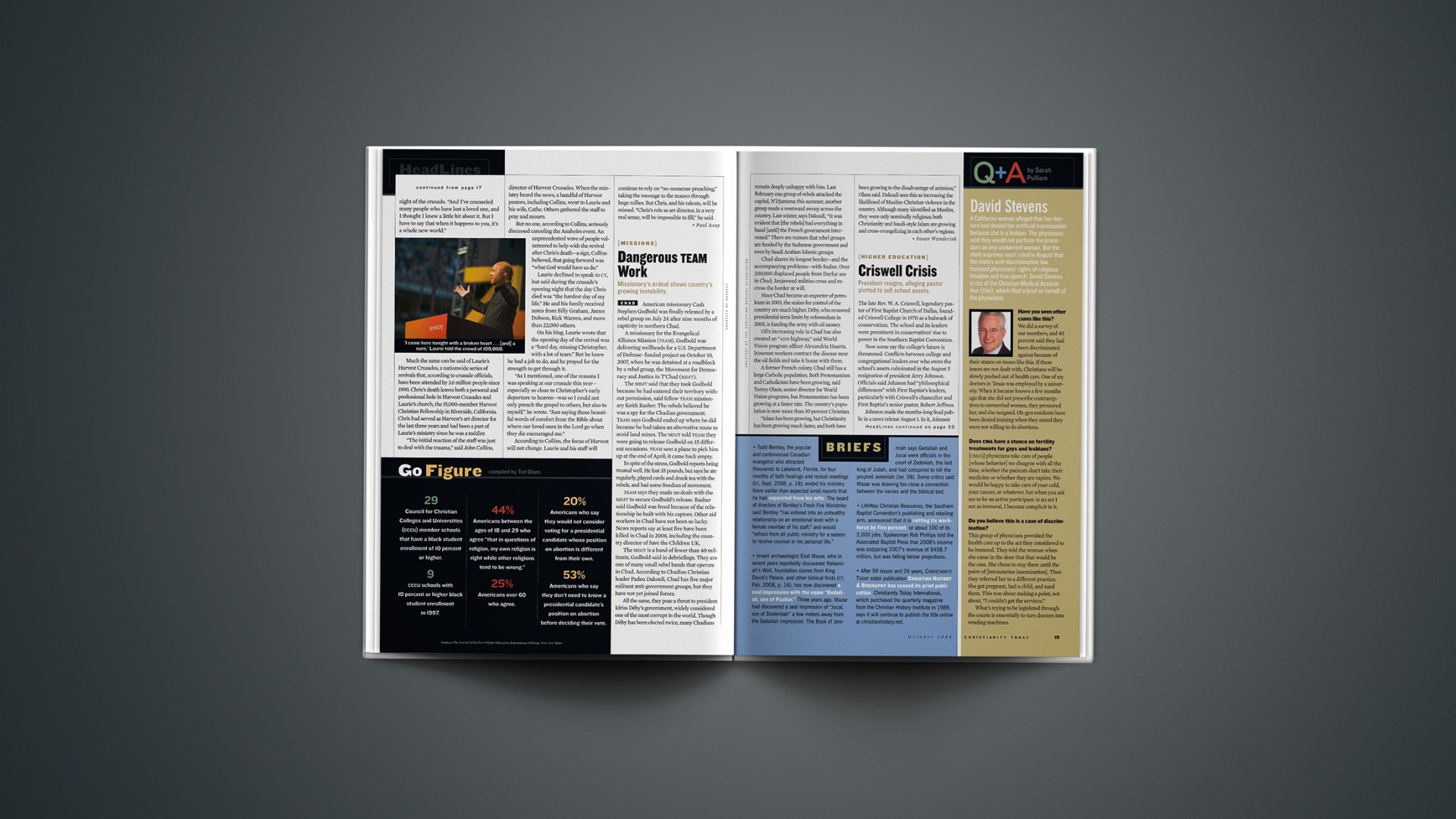American missionary Cash Stephen Godbold was finally released by a rebel group on July 24 after nine months of captivity in northern Chad.
A missionary for the Evangelical Alliance Mission (TEAM), Godbold was delivering wellheads for a U.S. Department of Defensefunded project on October 10, 2007, when he was detained at a roadblock
by a rebel group, the Movement for Democracy and Justice in T’Chad (MDJT).
The MDJT said that they took Godbold because he had entered their territory without permission, said fellow TEAM missionary Keith Rasher. The rebels believed he was a spy for the Chadian government.
TEAM says Godbold ended up where he did because he had taken an alternative route to avoid land mines. The MDJT told TEAM they were going to release Godbold on 15 different occasions. TEAM sent a plane to pick him up at the end of April; it came back empty.
In spite of the stress, Godbold reports being treated well. He lost 35 pounds, but says he ate regularly, played cards and drank tea with the rebels, and had some freedom of movement.
TEAM says they made no deals with the MDJT to secure Godbold’s release. Rasher said Godbold was freed because of the relationship he built with his captors. Other aid workers in Chad have not been so lucky.
News reports say at least five have been killed in Chad in 2008, including the country director of Save the Children UK.
The MDJT is a band of fewer than 40 militants, Godbold said in debriefings. They are one of many small rebel bands that operate in Chad. According to Chadian Christian leader Padeu Dakouli, Chad has five major militant anti-government groups, but they have not yet joined forces.
All the same, they pose a threat to President Idriss Déby’s government, widely considered one of the most corrupt in the world. Though Déby has been elected twice, many Chadians remain deeply unhappy with him. Last February one group of rebels attacked the capital, N’Djamena; this summer, another group made a westward sweep across the country. Last winter, says Dakouli, “It was evident that [the rebels] had everything in hand [until] the French government intervened.” There are rumors that rebel groups are funded by the Sudanese government and even by Saudi Arabian Islamic groups.
Chad shares its longest border—and the accompanying problems—with Sudan. Over 200,000 displaced people from Darfur are in Chad; Janjaweed militias cross and recross the border at will.
Since Chad became an exporter of petroleum in 2003, the stakes for control of the country are much higher. Déby, who removed presidential term limits by referendum in 2005, is funding the army with oil money.
Oil’s increasing role in Chad has also created an “AIDS highway,” said World Vision program officer Alexandria Huerta. Itinerant workers contract the disease near the oil fields and take it home with them.
A former French colony, Chad still has a large Catholic population. Both Protestantism and Catholicism have been growing, said Torrey Olsen, senior director for World Vision programs, but Protestantism has been growing at a faster rate. The country’s population is now more than 30 percent Christian.
“Islam has been growing, but Christianity has been growing much faster, and both have been growing to the disadvantage of animism,” Olsen said. Dakouli sees this as increasing the likelihood of Muslim-Christian violence in the country. Although many identified as Muslim, they were only nominally religious; both Christianity and Saudi-style Islam are growing and cross-evangelizing in each other’s regions.
Copyright © 2008 Christianity Today. Click for reprint information.
Related Elsewhere:
TEAM has a page they kept updated during the process of freeing Godbold.
BBC’s country profile of Chad includes more on president Idriss Deby.
“Fleeing from Chad, Waiting for Peace,” a slideshow, shows the daily lives of Chadian refugees who fled the country last winter.










